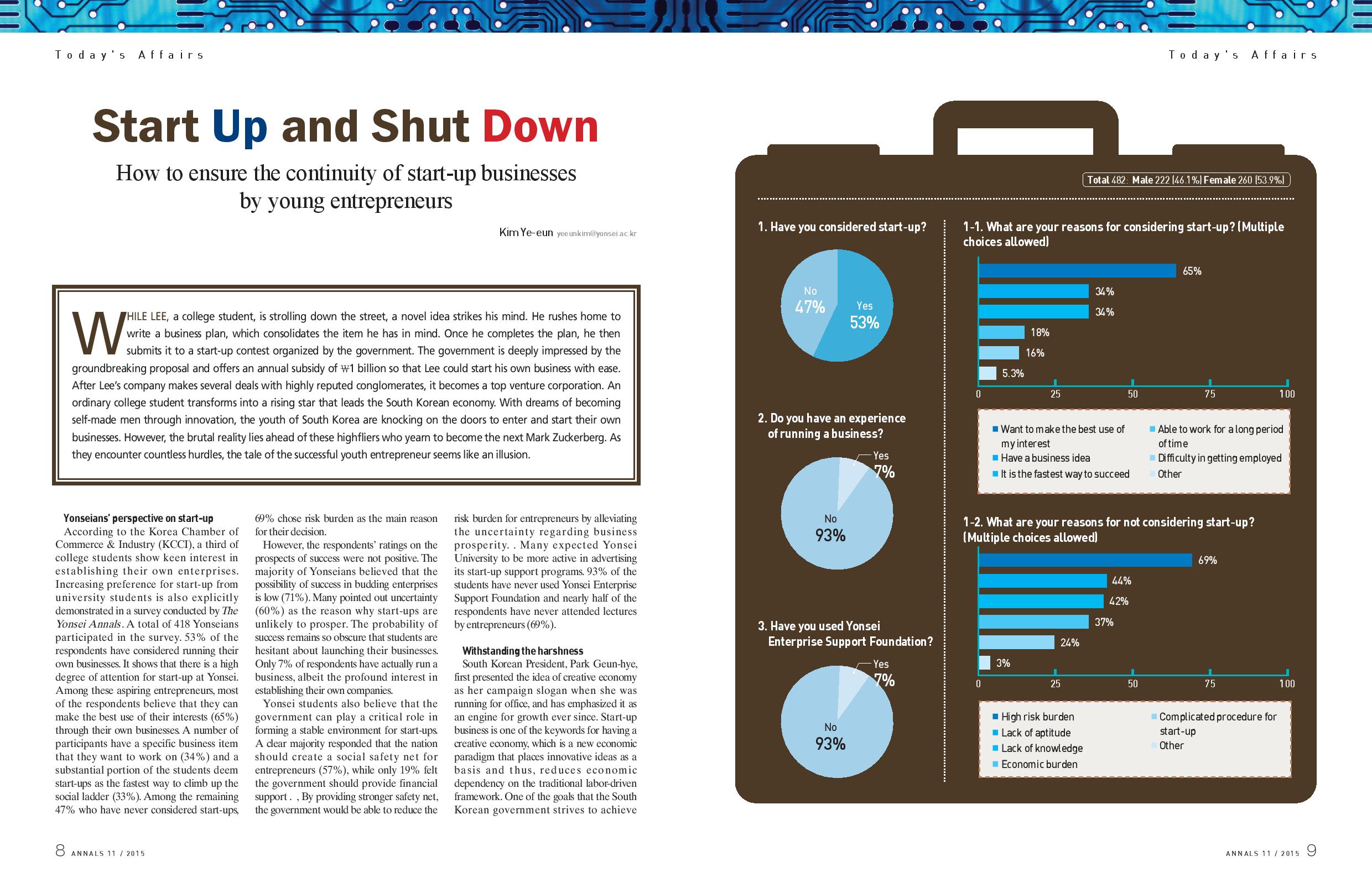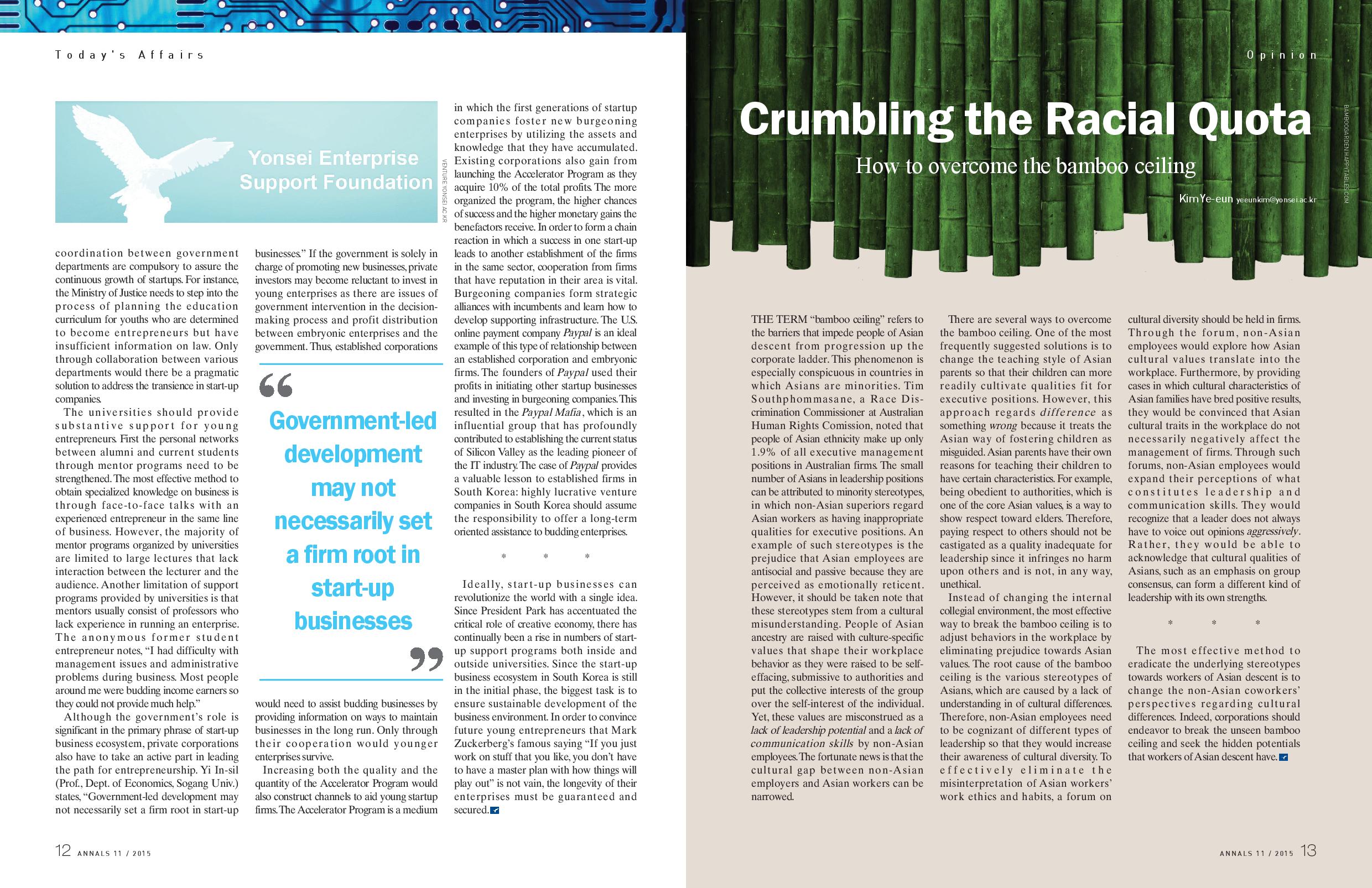How to ensure the continuity of start-up businesses by young entrepreneurs



WHILE LEE, a college student, is strolling down the street, a novel idea strikes his mind. He rushes home to write a business plan, which consolidates the item he has in mind. Once he completes the plan, he then submits it to a start-up contest organized by the government. The government is deeply impressed by the groundbreaking proposal and offers an annual subsidy of 1 billion so that Lee could start his own business with ease. After Lee’s company makes several deals with highly reputed conglomerates, it becomes a top venture corporation. An ordinary college student transforms into a rising star that leads the South Korean economy.
With dreams of becoming self-made men through innovation, the youth of South Korea are knocking on the doors to enter and start their own businesses. However, the brutal reality lies ahead of these highfliers who yearn to become the next Mark Zuckerberg. As they encounter countless hurdles, the tale of the successful youth entrepreneur seems like an illusion.
Yonseians’ perspective on start-up
According to the Korea Chamber of Commerce & Industry (KCCI), a third of college students show keen interest in establishing their own enterprises. Increasing preference for start-up from university students is also explicitly demonstrated in a survey conducted by *The Yonsei Annals*. A total of 418 Yonseians participated in the survey. 53% of the respondents have considered running their own businesses. It shows that there is a high degree of attention for start-up at Yonsei. Among these aspiring entrepreneurs, most of the respondents believe that they can make the best use of their interests (65%) through their own businesses. A number of participants have a specific business item that they want to work on (34%) and a substantial portion of the students deem start-ups as the fastest way to climb up the social ladder (33%). Among the remaining 47% who have never considered start-ups, 69% chose risk burden as the main reason for their decision.
However, the respondents’ ratings on the prospects of success were not positive. The majority of Yonseians believed that the possibility of success in budding enterprises is low (71%). Many pointed out uncertainty (60%) as the reason why start-ups are unlikely to prosper. The probability of success remains so obscure that students are hesitant about launching their businesses. Only 7% of respondents have actually run a business, albeit the profound interest in establishing their own companies.
Yonsei students also believe that the government can play a critical role in forming a stable environment for start-ups. A clear majority responded that the nation should create a social safety net for entrepreneurs (57%), while only 19% felt the government should provide financial support . By providing stronger safety net, the government would be able to reduce the risk burden for entrepreneurs by alleviating the uncertainty regarding business prosperity. . Many expected Yonsei University to be more active in advertising its start-up support programs. 93% of the students have never used Yonsei Enterprise Support Foundation and nearly half of the respondents have never attended lectures by entrepreneurs (69%).
Withstanding the harshness
South Korean President, Park Geun-hye, first presented the idea of creative economy as her campaign slogan when she was running for office, and has emphasized it as an engine for growth ever since. Start-up business is one of the keywords for having a creative economy, which is a new economic paradigm that places innovative ideas as a basis and thus, reduces economic dependency on the traditional labor-driven framework. One of the goals that the South Korean government strives to achieve through creative economy is to form a business ecosystem that is favorable for start-up firms. An increase in the number of companies led by young entrepreneurs, especially those in the Software (SW) sector, creates more employment positions because these firms have large assets that can be used for hiring. People in their 20s, also known as the *digital generation*, are at a greater advantage in obtaining fruitful results in the technological sector as they have been raised in high-tech environments and are adept at using cut-throat devices.
According to a research conducted by Korea Venture Business Association, the increase rate in employment reached 7.3% in SW firms on 2013. The statistic is starkly higher than employment rate in conglomerates, which is at 2.26%. The reason for this phenomenon is explained by high investment in SW companies. SW firms are able to accumulate assets with more ease because investors prefer to invest in these businesses and expect high profits in return. The enterprises then use these capitals to employ more labor forces. In fact, companies providing Information and Communications Technology (ICT) services have gained the largest portion of new investment as they have yielded 2,589 billion this July alone. If the younger generation takes a lead in establishing technology-oriented businesses, creative industry can flourish, leading to a boost in investment and in employment rates.
Another expected benefit of start-up businesses operated by youth is that the unproductive primary sector would be revitalized. Integrating cutting-edge technologies with the agricultural field would create an added value in the traditional industry. For instance, more energy will be saved and productivity will rise in managing livestock if an automatic control device is attached in barns. Thus, the hybrid of technology and agriculture will address the pressing issue in rural areas, which is a decline in the number of a younger population and consequently, the lack of labor. With an influx of a younger population with technological expertise, there will be more space for progress and stability in this relatively new form of industry in the long term.
Yet, tasks to ensure the longevity of young start-up businesses must be addressed to fully enjoy its benefits. One of the difficulties is the lack of a social safety net for those who flounder in business. Although youth entrepreneurs tend to have an advantage in using social network services as an advertising tool and planning creative and original business items, they often have insufficient field experience. An anonymous former student and entrepreneur, who used to run a pet supply store, states, “At the beginning, I believed coming up with an innovative idea was all that was needed for starting a new company.” He adds, “However, as time passed by, I recognized that entrepreneurial skills are of paramount importance. Because I learned business management by reading textbooks, I was unfamiliar with methods of advertising and providing customer services.” Establishing a business is a risky task since there is a high possibility of failure and yet, the individual has to cope with the financial costs alone. In addition, the burden of financial loss is heavier for young business starters who usually raise funds from government subsidies, bank loans or acquaintances due to their limited assets.
Accumulating assets through investment is one of the most essential factors to ensure the longevity of start-ups. However, many start-up companies have often been driven out of business as they were unable to find investors at their expansion stage. Dampened investment in embryonic enterprises is explained by the conservative operation of Venture Capital, which is comprised of market makers that invest, without mortgage, in venture firms. Venture Capital primarily invests in companies that have raised steady profits and those that have signed supply contracts with conglomerates. This July, 507 billion of new investment funds was devoted to firms that had been in business for over seven years, whereas 340 billion was spent on companies that have been operating for less than three years. Thus, large amounts of asset in Venture Capital are invested in companies that have stable revenue. Budding enterprises are less of Venture Capital’s concern. Moreover, the criteria for receiving investment from Venture Capital emphasize steady revenue and entrepreneurial skills, which young business owners comparatively lack. Under these disadvantageous positions, burgeoning companies are unable to withstand the cut-throat competition and are inevitably forced to forgo their businesses.
Paving a way for stability
The roles of the government, corporate firms and universities are crucial in encouraging more youth entrepreneurs to enter the market as well as ensuring their continuity in businesses. The government has its primary task at the initial stage of start-up. It should set the process to establish a startup easier by providing access to information as well as delivering the information in a format that is comprehensible to even non-experts. The most effective way to simplify the process is to adopt an all-in-one system that enlists all the necessary guidelines and regulations in establishing firms. Prospective entrepreneurs currently struggle with finding appropriate support programs because the application period, the required documents, and settlement methods differ depending on which department of government is in charge of the program. In fact, according to a survey conducted by Small and Middle Business Administration, 94.1% of respondents are unaware of the existence of the 218 government policies aimed to assist business starters. Thus, due to the exorbitant number of support programs that is widely dispersed across different government departments, applicants face a challenge in comprehending each specific detail.
To encourage future young entrepreneurs to implement their business plan into action, the government would have to reorganize the programs in a way that is more approachable and accessible to public. A single webpage that provides procedure guidelines on assistance schemes, information on affiliated programs relevant to the respective business sector, and actions required to take before proceeding to the next step would eliminate the need to visit websites of different departments. Moreover, better communication and coordination between government departments are compulsory to assure the continuous growth of startups. For instance, the Ministry of Justice needs to step into the process of planning the education curriculum for youths who are determined to become entrepreneurs but have insufficient information on law. Only through collaboration between various departments would there be a pragmatic solution to address the transience in start-up companies.
The universities should provide substantive support for young entrepreneurs. First the personal networks between alumni and current students through mentor programs need to be strengthened. The most effective method to obtain specialized knowledge on business is through face-to-face talks with an experienced entrepreneur in the same line of business. However, the majority of mentor programs organized by universities are limited to large lectures that lack interaction between the lecturer and the audience. Another limitation of support programs provided by universities is that mentors usually consist of professors who lack experience in running an enterprise. The anonymous former student entrepreneur notes, “I had difficulty with management issues and administrative problems during business. Most people around me were budding income earners so they could not provide much help.”
Although the government’s role is significant in the primary phrase of start-up business ecosystem, private corporations also have to take an active part in leading the path for entrepreneurship. Yi In-sil (Prof., Dept. of Economics, Sogang Univ.) states, “Government-led development may not necessarily set a firm root in start-up businesses.” If the government is solely in charge of promoting new businesses, private investors may become reluctant to invest in young enterprises as there are issues of government intervention in the decision-making process and profit distribution between embryonic enterprises and the government. Thus, established corporations would need to assist budding businesses by providing information on ways to maintain businesses in the long run. Only through their cooperation would younger enterprises survive.
Increasing both the quality and the quantity of the Accelerator Program would also construct channels to aid young startup firms. The Accelerator Program is a medium in which the first generations of startup companies foster new burgeoning enterprises by utilizing the assets and knowledge that they have accumulated. Existing corporations also gain from launching the Accelerator Program as they acquire 10% of the total profits. The more organized the program, the higher chances of success and the higher monetary gains the benefactors receive. In order to form a chain reaction in which a success in one start-up leads to another establishment of the firms in the same sector, cooperation from firms that have reputation in their area is vital. Burgeoning companies form strategic alliances with incumbents and learn how to develop supporting infrastructure. The U.S. online payment company Paypal is an ideal example of this type of relationship between an established corporation and embryonic firms. The founders of Paypal used their profits in initiating other startup businesses and investing in burgeoning companies. This resulted in the Paypal Mafia, which is an influential group that has profoundly contributed to establishing the current status of Silicon Valley as the leading pioneer of the IT industry. The case of Paypal provides a valuable lesson to established firms in South Korea: highly lucrative venture companies in South Korea should assume the responsibility to offer a long-term oriented assistance to budding enterprises.
* * *
Ideally, start-up businesses can revolutionize the world with a single idea. Since President Park has accentuated the critical role of creative economy, there has continually been a rise in numbers of start-up support programs both inside and outside universities. Since the start-up business ecosystem in South Korea is still in the initial phase, the biggest task is to ensure sustainable development of the business environment. In order to convince future young entrepreneurs that Mark Zuckerberg’s famous saying “If you just work on stuff that you like, you don’t have to have a master plan with how things will play out” is not vain, the longevity of their enterprises must be guaranteed and secured.

